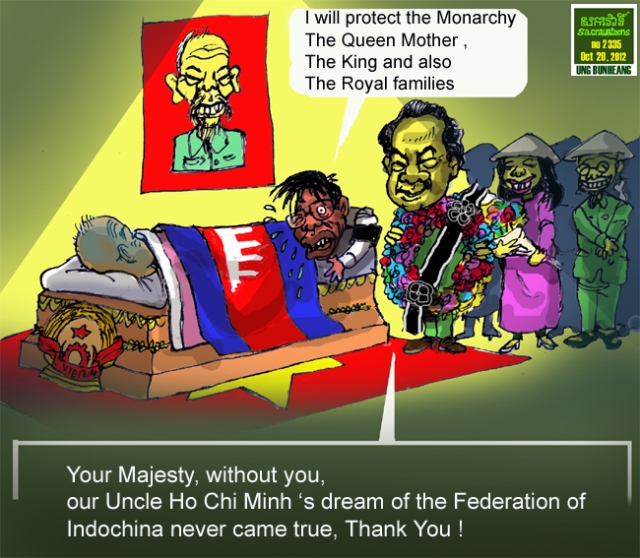 |
| Stalin - front right - next to the corpse of Lenin.
In his 'Testament' Lenin had warned his followers against the danger
posed by Stalin's rise to power, describing the latter as 'rude' among
other things, and called for his |
 |
| Drawing by Sacravatoons |
 |
| Hun Sen - second from left - maintained a sombre expression and pledged to carry on the controversial late former Monarch's legacy - School of Vice [image credit: google] |
"Stalin took a prominent and very public role in the mourning of the leader, but in fact Lenin's death put him in a jubilant mood."
Throughout the summer of 1923, Lenin lay close to death, and
a lull settled over the political struggle. But the battle lines were forming
in the Politburo and Central Committee. Trotsky seemed to hold the most
powerful position, thanks to his close friendship with Lenin before the Soviet
leader's strokes, but an opposition had already begun to emerge. Although
Stalin would later be Trotsky's primary antagonist, for the moment the
opposition included not only Stalin but also two other politicians: Lev Kamenev
and G.E. Zinoviev, a leading Bolshevik who had been Lenin's closest aide during
the Revolution. Together the three formed what was referred to as the
"troika," or "triumvirate"; as Lenin inched closer to
death, they launched a series of attacks on Trotsky in party meetings, drawing
on his writings and speeches from his years as a Menshevik to attack him for
disloyalty to his own movement.
On January 21, 1924, Lenin died. He was only fifty-three. Trotsky
was away in the Caucasus that month, and Stalin telegraphed him and said that
the funeral would be held immediately, so there was no point in undertaking the
long trip back to Moscow. Thus Stalin forced Trotsky to be absent for the
funeral--he knew how to create and use symbols to his advantage.
Meanwhile, the cult of Lenin instantly sprang up among the Bolsheviks, who
ordered their leader's body embalmed and turned into a shrine in Moscow's Red
Square. Stalin took a prominent and very
public role in the mourning of the leader, but in fact Lenin's death put him in
a jubilant mood. However, the death did bring Stalin his share of
difficulties: Lenin's Testament, with its warning against Stalin and suggestion
that he be removed from leadership, was read at the next Central Committee
meeting. This was a critical moment: if his rivals had demanded compliance with
the testament at this point, Stalin would not have survived their attacks--his
support base was not yet large enough. However, Trotsky kept silent and
Stalin's allies, Kamenev and Zinoviev, came to his defense; Stalin retained his
post as General Secretary.
Source: sparknotes.com

No comments:
Post a Comment